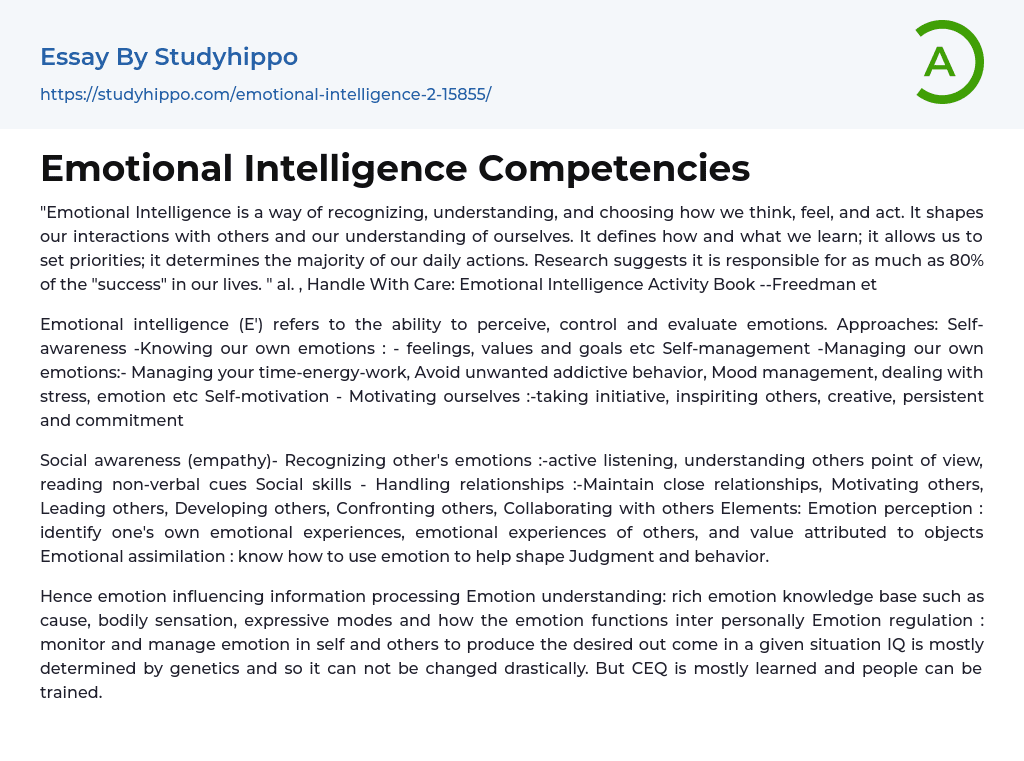Emotional Intelligence (EI) refers to our ability to recognize, understand, and make decisions about our thoughts, emotions, and behaviors. It has an impact on how we interact with others and how self-aware we are. Furthermore, it affects our learning process, prioritization skills, and daily activities. Research has demonstrated that EI contributes up to 80% of our overall success in life (Freedman et al., Handle With Care: Emotional Intelligence Activity Book).
Approaches to EI encompass various aspects. Self-awareness involves recognizing our own emotions, including feelings, values, and goals. Self-management focuses on effectively managing time, energy levels, work tasks while also avoiding addictive behavior and coping with stress among other things. Self-motivation entails inspiring ourselves, taking initiative, being creative and persistent in achieving goals.
Social awareness or empathy entails identifying the emotions of others through active listening skills as well as understan
...ding different perspectives and interpreting non-verbal cues.
Social skills are essential for handling relationships which include maintaining close connections with others by motivating them as well as leading development efforts. Additionally addressing conflicts skillfully and collaborating effectively with others is crucial.
Elements of EI involve emotion perception which includes identifying one's own emotions along with those of others while comprehending their significance.
Emotional assimilation is when emotions are used to shape judgments and behavior affected by information processing. Understanding emotions means having extensive knowledge about what causes them, the bodily sensations they create, how they are expressed, and their interpersonal functions. Regulating emotions involves monitoring and managing them in oneself and others to achieve desired outcomes in specific situations. Unlike IQ, which is mostly determined by genetics and not easily changed, Emotional Intelligence Quotient (CEQ) is
mainly acquired through learning and can be enhanced through training.
- Pressure essays
- Confidence essays
- Disgrace essays
- Lost essays
- Harmony essays
- Fairness essays
- Sarcasm essays
- Respect essays
- Responsibility essays
- Empathy essays
- Suffering essays
- Suspense essays
- Fear essays
- Feeling essays
- Loneliness essays
- Ambition essays
- Tolerance essays
- Hope essays
- Inspiration essays
- Kindness essays
- Shame essays
- Desire essays
- Doubt essays
- Grief essays
- Hate essays
- Laughter essays
- Passion essays
- Pride essays
- Forgiveness essays
- Happiness essays
- Humanity essays
- Loyalty essays
- Guilt essays
- Honesty essays
- Betrayal essays
- Need essays
- Boredom essays
- Courage essays
- Regret essays
- Anger essays
- Honor essays
- Honesty Is The Best Policy essays
- John Locke essays
- 9/11 essays
- A Good Teacher essays
- A Healthy Diet essays
- A Modest Proposal essays
- A&P essays
- Academic Achievement essays
- Achievement essays




